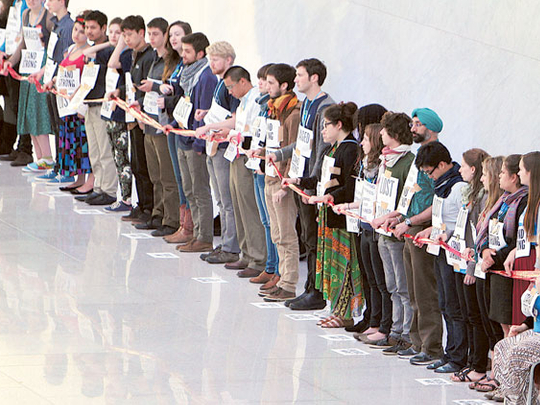
DOHA
Weak proposals to extend until 2020 a shrivelled UN plan to fight climate change pushed marathon talks to the brink of collapse on Saturday.
Delegates from nearly 200 nations spent hours poring over a package deal put forward by the host Qatar that would also postpone until 2013 a row over demands from developing nations for more cash to help them cope with global warming.
Developing nations were divided over the modest deal that all sides said fell short of recommendations by scientists for tougher action to try to avert more heatwaves, sandstorms, floods, droughts and rising sea levels.
The draft deal would extend the Kyoto Protocol for eight years. It had obliged about 35 industrialised nations to cut greenhouse gas emissions by an average of at least 5.2 per cent below 1990 levels during the period from 2008 to 2012.
Kyoto will expire at the end of 2012 if it is not extended and has been weakened by the withdrawals of Russia, Japan and Canada. The United States never ratified it, and its backers, led by the European Union and Australia, account for just 15 percent of world greenhouse gas emissions.
Expiry of Kyoto would leave the world with no legally binding deal to confront global warming, merely a patchwork of national laws to rein in rising carbon emissions.
The two-week UN meeting in the Qatari capital had been due to end on Friday but the talks went on past midday on Saturday.
“I believe this is a package we can all live with,” conference president Abdullah Bin Hamad Al Attiyah said as he presented the Qatari proposal early on Saturday.
Most importantly, the proposal would keep alive hopes for a new, global UN deal to fight climate change due to be agreed by 2015 and enter into force by 2020 after past failures.
The 2015 deal would set goals for all nations, including emerging economies led by China and India that have no targets under Kyoto.
Qatar proposes that parties to Kyoto would have to revisit their targets for cuts in greenhouse gas emissions by 2014, perhaps to make tougher goals, a concession to developing nations that had wanted Kyoto extended by only five years.
In a blow to the demands of developing nations for a clear timetable for a promised tenfold increase in aid to $100 billion a year by 2020, the draft deal merely agreed to put off decisions to 2013.
The United States, Europe and other developed nations, facing an economic slowdown at home, have refused to set a timetable for a rise in aid.
The document also outlined possible ways to meet developing nations’ demands for a new mechanism, including insurance, to help them confront losses and damage caused by rising sea levels or storms linked to climate change.
World carbon dioxide emissions are set to rise by 2.6 per cent this year, and are more than 50 per cent higher than in 1990. Recent growth has come mostly from emerging nations, led by China and India.












